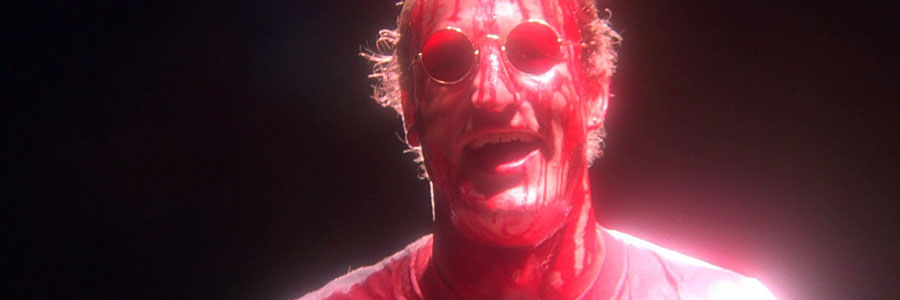
Natural Born Killers
Warner Bros.
Original release: August 26th, 1994
Running time: 119 minutes
Director: Oliver Stone
Writer: Oliver Stone, Dave Veloz, Richard Rutowski
Cast: Woody Harrelson, Juliette Lewis, Robert Downey, Jr.
The execution of Wayne Gale 01:43:42 to 01:44:58
Deconstructing Cinema: One Scene At A Time, the complete series so far
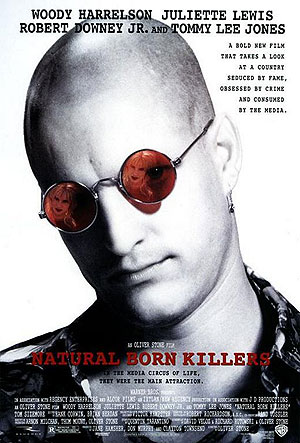
There’s a short-lived and unproductive national debate in the United States that always takes place after mass shootings. It’s normally as predictable as it is cynical, loud noises go back and forth repeatedly and then slowly die down in the wake of latest news-cycle. In the aftermath of the Sandy Hook Elementary School shooting on December 14th 2012, there came the debate again from the usual suspects on the left and right, but I soon noticed that the discourse became mildly less generic from its previous incarnations. There can be very little doubt that it was the average age of the victims – mostly first grade students – that generated a different tone within the discourse.
This meant that some of the familiar finger-pointing was replaced by a certain amount of willingness to look at one’s own backyard and look for solutions there. Perhaps this sounds somewhat better than it actually was, I’m sure those who followed unfolding events would be quick to remind me of the now infamous speech by vice president of the National Rifle Association, Wayne LaPierre, in which he did nothing but finger-pointing only one week after Sandy Hook. But still, in the spirit of a different tone, I started to look at my own backyard which is cinema. Films of course – along with video games – have been consistently brought up as possible parts of a very complex problem and the film I felt I had to revisit was Oliver Stone’s controversial Natural Born Killers.
Of course I can watch this film today and draw my conclusions, but there’s no way I can escape how I felt about it when a much younger me saw it for the first time many years ago. In spite of always jumping to defend the film as well a cinema in general against critical voices, the truth is, that impressionable and not-quite-grown-up young man didn’t necessarily take away what was meant to be taken away from the experience. Not to dance around it too long, I understood what the movie was trying to convey on first viewing, but I took that message in a very “pro-Mickey and Mallory” rage-against-the-machine sort of way. The message of the film, first and foremost is a satirical critique of the media and its dubious choices of who gets to be a celebrity:
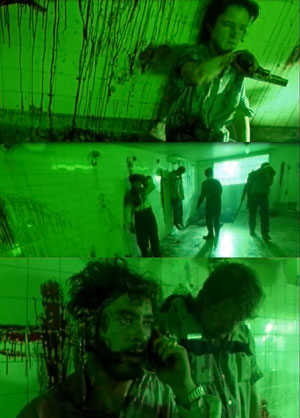
Given this intended message – confirmed of course by Stone himself – I wanted to take a closer look in the wake of Sandy Hook to see if Natural Born Killers is effective in conveying this message or not. The scene I thought would help me best in trying to find the answer is the scene of Mickey and Mallory’s very first kill. By first kill, I don’t mean the killing of Mallory’s parents – although technically this is their first kill together – because this act was motivated by revenge. The killing of the parents doesn’t really play into this as it’s a type of domestic crime that’s fairly commonplace and does not necessarily lead the perpetrators to go on a killing spree afterwards.
What I needed instead was the scene of the couple’s first kill of a stranger as they begin their journey to becoming media-superstar-mass-murders. This is the scene that should’ve the capacity to give us an insight into the minds of the killers and we might be able to identify the moment where they decided their ultimate fate. Have you ever noticed that this scene is not in the film? It did come to me as a surprise on my recent viewing. There’s a mock TV reconstruction of them murdering a cop, but even that scene is described as their first cop killing and not their first kill on the road. All of the kills that we’re allowed to see are committed by an already veteran couple who routinely do what they set out to do at some point off-screen. This is perhaps one of the film’s failings. Mickey and Mallory are portrayed as victims of a corrupted system and thereby the burden of responsibility is effectively removed from the characters, while the first kill – a significant breaking point – is omitted from the film.
In spite of looking for this particular scene in vain, I found another that is perhaps even more directly telling of the film’s successes and failures. The man everyone loves to hate is of course tabloid TV personality Wayne Gale – Robert Downey Jr. in a memorable performance – who represents the media in the story. As the film is moving towards its conclusion, Gale finds himself alone in a forest with the murderous couple after having revealed his own dark and violent impulses during a chaotic prison break. Here, Mickey and Mallory get ready to do to him what they normally do to everyone else:
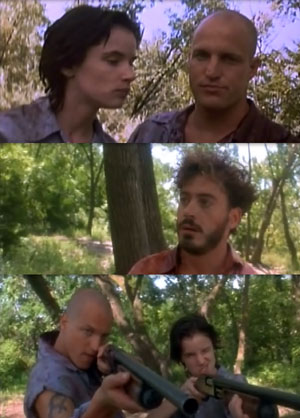
Oh we’re gonna do a little wrap-up alright but it won’t be you staring in the camera looking dumb and acting stupid. You’re gonna be staring down at the barrels of our shotguns and we’re gonna be blowing your brains all over that tree back there.
GALE:
Wait, wait, time, cut cut cut! This is a fucking joke right? Come on don’t fucking shoot me, I though during this whole escape thing a bond developed between us!”
MICKEY:
No, not really. You’re scum Wayne. You did it for ratings. You don’t give a shit about us, you don’t give a shit about anybody except yourself. That’s why nobody gives a shit about you, that’s why helicopters were not deployed.
GALE:
Wait a minute you fucking hypocrite, what about the Indian? You said that you were done with killing, you said love beats the demon!
MICKEY:
I am and it will. It’s just that you are the last one. This is not about you, you egomaniac. I kind of like you. But if we let you go we’d be just like everybody else. Killing you and what you represent is a statement. I’m not a 100% sure what it’s saying but you know, Frankenstein killed Dr. Frankenstein.
The execution of Wayne Gale makes it quite clear where the film thinks all the blame should go. The statement Mickey is “not a 100% sure” about seems to be that the media has such powerful corrupting influence on individuals that they are essentially relieved of all responsibility of their actions. This is probably why I had strong sympathy and even admiration for Mickey and Mallory when my younger self saw the film for the first time. I saw them as heroic figures who took control in a world where they started out as underdogs. If they really were ‘Frankenstein’s monsters’ created by a sensationalist, desensitised culture than they very well deserve the happy ending the film had in store for them.
- Sharett, Christopher; Mythologies of Violence in Postmodern Media (1999), Wayne State University Press
Watching the film today the Frankenstein metaphor feels flawed and hopelessly self-indulgent. Frankenstein’s monster had no say or free will in its own creation and therefore his creator is solely responsible for the monster’s actions. Natural Born Killer’s dismissal of personal responsibility and blame-the-media attitude is where the movie fails as satire. All of the valid criticism – and the criticism is valid without doubt – it has to offer on the media is undermined by its glorifying and victimising Mickey and Mallory. It’s an unbalanced portrayal I can’t accept today, it feels wrong to take on the subject of serial killing and satirise only one thing while giving the other a free pass.
The film doesn’t seem to be any better than the media it set out to criticise in the first place. It’s ironic that it puts so much blame on the media as many people – including Wayne LaPierre – do just that in today’s recurring debates in the wake of the latest mass shootings. But when those people use the word “media”, they include Natural Born Killers under the same umbrella. If we find a copy of Natural Born Killers in possession of a mass murderer with some evidence of influence, we have a choice between blaming Oliver Stone and holding the perpetrator responsible for his actions. I think we should opt for the latter, but surely, Stone should’ve done the same in Natural Born Killers.
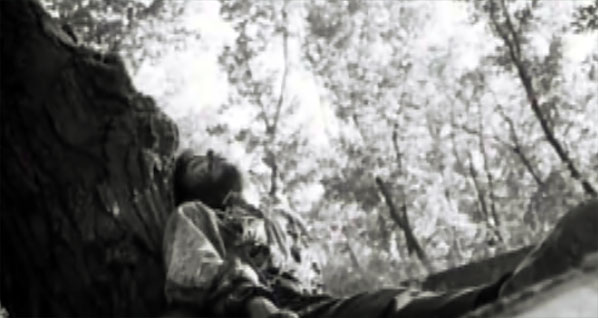

Arpad Lukacs
Arpad is a Film Studies graduate and passionate photographer (he picked up the camera and started taking stills just as he began his studies of moving pictures). He admires directors that can tell a story first of all in images. More or less inevitably, Brian De Palma has become Aprad’s favourite filmmaker.
Then there’s Arpad’s interest in anime. He was just a boy when he saw Nausicaä of the Valley of the Wind on an old VHS and was hypnotised by the story of friendship, devotion and sacrifice. He still marvels at the uncompromising and courageous storytelling in Japanese anime, and wonders about the western audience with its ever growing appetite for “Japanemation”.
Have a look at Arpad's photography site, and you can follow him on Twitter @arpadlukacs.
© 2022 STATIC MASS EMPORIUM . All Rights Reserved. Powered by METATEMPUS | creative.timeless.personal. | DISCLAIMER, TERMS & CONDITIONS
HOME | ABOUT | CONTACT | TWITTER | GOOGLE+ | FACEBOOK | TUMBLR | YOUTUBE | RSS FEED
CINEMA REVIEWS | BLU-RAY & DVD | THE EMPORIUM | DOCUMENTARIES | WORLD CINEMA | CULT MOVIES | INDIAN CINEMA | EARLY CINEMA
MOVIE CLASSICS | DECONSTRUCTING CINEMA | SOUNDTRACKS | INTERVIEWS | THE DIRECTOR’S CHAIR | JAPANESE CINEMA





